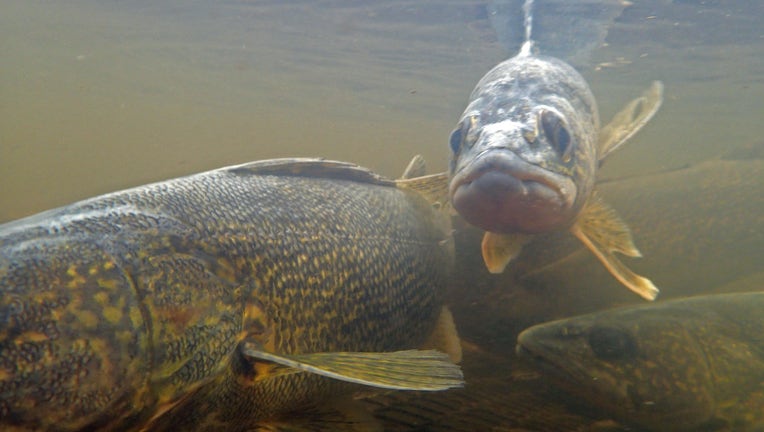MDH: Don't eat fish from these Minnesota lakes and rivers

Walleye fish caught in a trap at a Minnesota Department of Natural Resources egg collection and fertilization station on the Pine River in Crow Wing County, Minn., await their separation into male and female groups. (Photo by Dennis Anderson/Star Tri (Getty Images)
ST. PAUL, Minn. (FOX 9) - Per-and polyfluoralkyl substances (PFAS), also known as forever chemicals, have reached unsafe levels in some Minnesota waterways, making certain fish unsafe for human consumption.
The Minnesota Department of Health (MDH) says waterways in 10 different counties are impacted by the new consumption guidance.
Updated state fish consumption guidelines can be found here.
Don't eat these fish
What they're saying:
MDH said the following fish should not be eaten by anyone:
- All species of fish caught in Minnesota River Valley ponds and Long Meadow Lake (Hennepin County).
- Bass caught in Mooney Lake (Hennepin County).
- Walleye caught in George Lake (Martin County).
- Yellow perch and common carp caught in Otter Lake, McCuen Creek, Bear Creek and the south fork of the Crow River (McCleod and Carver counties).
Big picture view:
MDH officials add that the new guidance is less restrictive than before for rainbow smelt caught in Lake Superior. The updated guidance states that one serving per week is now safe, while the previous guidance was one serving per month.
Some waterbodies impacted by unsafe PFAS levels in the metro are in Anoka, Carver, Dakota, Hennepin and Ramsey counties, as well as Douglas, Martin, McLeod and St. Louis counties in Greater Minnesota.
Specific guidance for a particular body of water can be found on the DNR's LakeFinder website.
What they're saying:
MDH Fish Consumption Guidance Program lead Angela Preimesberger shared this statement:
"Our fish consumption guidance can help anglers and their families make informed choices about which fish to eat and how often. Following the guidance enables you to reduce your exposure to contaminants while still enjoying the many benefits of eating fish, which is an important part of a healthy, well-balanced diet."
PFAS in Minnesota
Dig deeper:
PFAS are defined as harmful chemicals used to make products that can resist heat, oil, stains, grease and water, according to Minnesota health officials. The chemicals are linked to developmental effects such as low birth weight in infants and weaker immune systems in children.
Exposure to PFAS can also cause changes to liver function and increase cancer risks, MDH says.
The Minnesota-based company, 3M, is currently paying out money to victims for a historic settlement that stemmed from dumping waste in the Twin Cities east metro.
READ MORE: 3M PFAS lawsuits cost billions. Insurance giant AIG doesn't want to pay.
The Source: This story used information shared in a news release from the Minnesota Department of Health and past FOX 9 reporting.

